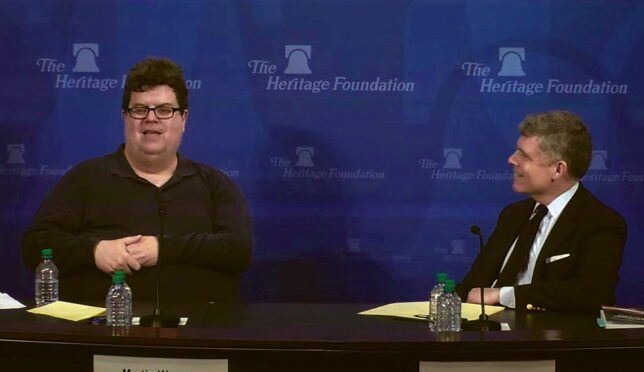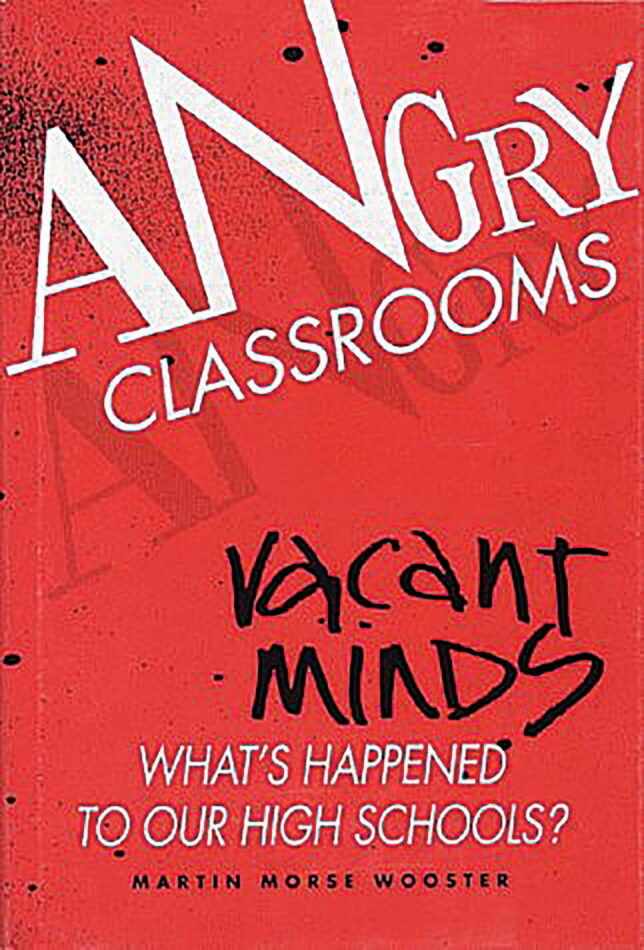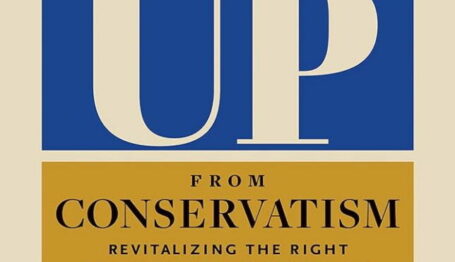Special Report
Martin Morse Wooster: Book Man
A brilliant eccentric who battled Big Philanthropy and Big Government
 Martin Morse Wooster (l) and Scott Walter (r) discussing How Great Philanthropists Failed at the Heritage Foundation, 2018. Credit: The Heritage Foundation. License: https://bit.ly/3RFCx6E.
Martin Morse Wooster (l) and Scott Walter (r) discussing How Great Philanthropists Failed at the Heritage Foundation, 2018. Credit: The Heritage Foundation. License: https://bit.ly/3RFCx6E.

Martin Morse Wooster, 1957–2022 (full series)
Book Man | Martin’s Genuine “Civic Participation”
Big Martin vs. Big Philanthropy
Martin Morse Wooster, longtime senior fellow at the Capital Research Center and a friend of mine for decades, was cruelly cut down by a hit-and-run driver at the end of last year. Both his long service to CRC and our personal friendship demand a proper accounting of his many contributions to the country he loved.
Martin was indeed the last WASP eccentric, as his friend Richard Miniter of Zenger.news put it (see the assembly of reflections on Martin we published here). To grasp his Old WASP side, consider that he proudly lived in Silver Spring, Maryland, on land his Revolutionary ancestors had owned, and that landmarks near the oldest Ivy League colleges are named for his forebears.
As for Martin’s eccentricities, they included an indifference to attire equal to P.G. Wodehouse’s famous character Lord Emsworth. I vaguely recall seeing Martin at a formal gala wearing one of those T-shirts whose fronts are printed with a parody of black tie and lasagna ruffles. Another eccentricity was his daily consumption of oceans of books, newspapers, and magazines on every subject imaginable and several beyond the imaginations of most of us. As the wit Thomas Hazlett puts it in a wonderful tribute, an entire library was to Martin but an “after-dinner mint.”
This bibliophilia led to two additional eccentricities: First, I and a legion of other friends would regularly receive fat manilla envelopes of clippings from him on anything he associated with us. For example, a friend with Argentine heritage and academic work on Nixon would receive anything Martin saw on Argentina or the 37th president. One named John Miller would receive not only any mentions of his last book but also anything mentioning other John Millers in America. My last two envelopes had 10 clippings from sources like the Financial Times and Washington Post on such topics as a DC teachers union endorsing a mayoral candidate, climate activists in Uganda, a minimum wage law, my alma mater Georgetown’s latest masking idiocy, a Starbucks unionization campaign, an argument for universities to refuse energy companies’ largess, and civil society in Ukraine.
The other eccentricity related to Martin’s oceanic consumption of the printed word was the fallout produced in his apartment. For more on that, read his article complaining that the fire marshal insisted on annual inspections of his digs to ensure Martin’s entire building didn’t combust from the kindling he stacked to the ceiling. More touchingly, local children in the not-affluent neighborhood referred to him as “Book Man,” because as Miniter relates, when a local girl was in need of a dry and warm place to wait for her mom, Martin kindly took her in, and she was awestruck by Martin’s mountains of books and paper.

Members of the 4th estate: Mike Horkan (l) and Martin Morse Wooster (r) of Mid-Atlantic Brewing News. 21st annual running of the Multiple Guest Brewmaster Winter Holidaze Tasting Extravaganzee at the Brickskeller Down Home Saloon, in Washington, DC. Credit: Thomas Cizauskas. License: https://bit.ly/3jGKdJo.
Also like Lord Emsworth, Martin had passionate interests—a better word in his case than hobbies, because Martin tended to become a public expert in the fields he pursued. For instance, at his death he was attending a conference on Ales Through the Ages in Williamsburg, Virginia, because brewing and its products were one of his great loves, and he had long contributed columns and articles on the ancient art to publications in the field such as All About Beer and Mid-Atlantic Brewing News. His thirsty interest ranged as far as the antipodes, where Martin once defended brewers Down Under against the greedy taxman in the Australian Financial Review, though I’m not sure if this was before or after he visited his friend Tom Switzer, one of the nation’s leading conservative intellectuals, in Sydney. This beery passion helps to explain how Martin could be a mountain of a man—six-foot-four and the opposite of svelte, a “hefto-American” as he put—and yet remain through his six and a half decades something of an eternal boy, or rather a frat boy, because he loved his fraternity days back at Beloit College in Wisconsin.
Another passion Martin built into expertise was science fiction, and he was mourned at multiple SF publications like Locus and File 770. I note the International Science Fiction Data Base has compiled his bibliography in the field. The comments on the File 770 obituary reveal the wide range of friends and readers he had, while the editors of Locus observe that he had sent them “news, letters, and corrections for decades.”
Ah, yes, corrections. Every publication Martin had relations with would receive regular notes on any mistake he observed in his reading, from a missing letter in a proper name to the fact that in the year being discussed, the company went by the name Exxon not ExxonMobil. This recalls Martin’s cantankerous side, because his manners no less than his dress were not conventional. One never knew when he might burst out singing, say, “Hail to the Redskins.” I treasure the story Bill Kauffman tells of Martin, in a room full of media liberals and RINOs, belting out a Barry Goldwater campaign song in hopes of annoying the assembly.
Martin’s SF expertise led him to review many books in the field for the Washington Post, while his expert knowledge of education policy led him to do regular Washington Times reviews of books in that field. He also wrote an entire book on schools with the pungent title, Angry Classrooms, Vacant Minds: What’s Happened to Our High Schools?

His expert knowledge of education policy led him to do regular Washington Times reviews of books in that field. He also wrote an entire book on schools with the pungent title Angry Classrooms, Vacant Minds: What’s Happened to Our High Schools? Credit: Amazon. License: https://amzn.to/3XdPaa8.
His many magazine connections over the years included an array of editorial positions at publications as diverse as the libertarian Reason, the liberal Harper’s, the establishment Wilson Quarterly, and the conservative American Enterprise, where I first met him in the 1990s. His friendships were similarly ecumenical, which is a tribute to his good nature and sprawling interests.
In the field of philanthropy, where he achieved his greatest prominence, he wrote over the years for the Philanthropy Roundtable; the late, lamented Bradley Center for Philanthropy and Civic Renewal; the Chronicle of Philanthropy; and PhilanthropyDaily.com, as well as occasional stinging op-eds for the Wall Street Journal. One of my favorites of those was an essay in which he surveyed the many chairs of “free market economics” that naïve businessmen had endowed at our poor institutions of higher learning. Nearly every one of those chairs soon ended up warming the bottoms of socialists, as Martin could have told the foolish donors if they had consulted him, because one of his greatest themes was “the problem of donor intent”—that is, the capture by left-wing activists of philanthropies endowed by conservative donors.
This phenomenon of left-wing greed featured in another superb Wall Street Journal op-ed of Martin’s, which dissected then-president Rebecca Rimel’s driving of the Pew Charitable Trusts far from the donors’ staunch conservatism into trendy leftism. Martin described Rimel’s philosophy as “castor-oil liberalism” and concluded that “out of simple fairness,” the trust “should have dropped the name Pew in the same way it has dropped the principles that guided its founders.”
No wonder I recall Martin saying the switchboard at Pew was told to reject his calls. As he knew, Big Philanthropy sails its mega-yachts over waves of pretense. Those pretenses include the laughable claim that billionaire foundations like the Pew Trusts, the Ford Foundation, MacArthur, and so forth have no ideology and no political agenda. Another risible pretense is that Big Philanthropy, first, cares about the little guy, and second, can crunch numbers and exercise its exalted expertise to solve all the little guy’s problems by eliminating their “root causes.”
Martin, by contrast, was a defender of Little Philanthropy, the kind where you know the name of the persons you help and, more radical still, you value the help you receive from your fellow citizens in return. This bedrock of America and her exceptional civil society, extolled by the likes of Alexis de Tocqueville and welfare reformer Marvin Olasky, was central to Martin’s thought and, even more, to his humble life in a nondescript suburb, as we saw with the case of the girl who needed temporary shelter waiting for her mother. Similarly, his death brought deep sadness to his friends in “little platoons” like the Potomac River Science Fiction Society. It also brought talk that his colleagues at the Friends of the Library may commemorate his service as steward of one of the little libraries in Takoma Park.
In the next installment, perhaps Martin’s finest work on the great struggle between true charity and fake philanthropy.



